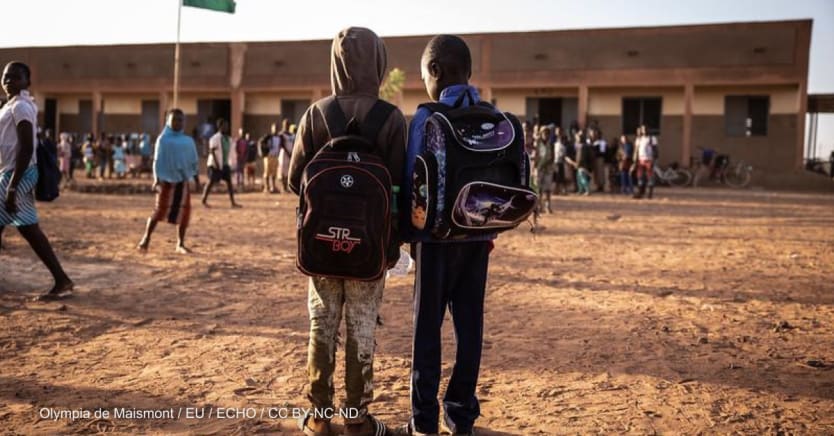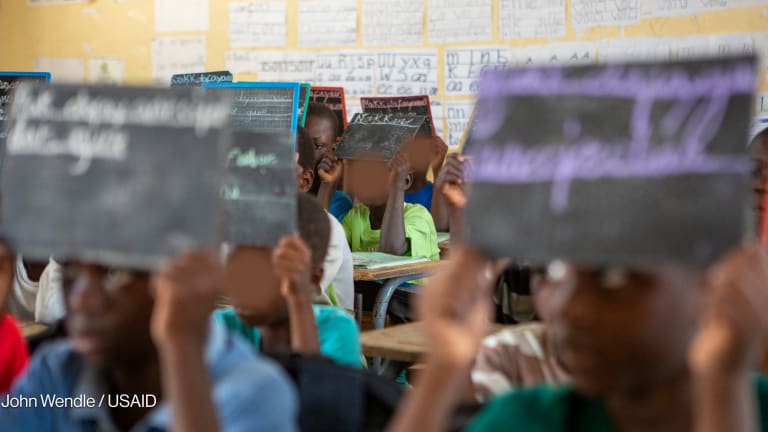
If the global community truly wants children to catch-up in COVID-19’s aftermath, we must fill the global teacher shortage to power this effort. UNESCO estimates the teacher shortfall is nearly 69 million, 70% of whom are needed in sub-Saharan Africa. Building a workforce of community teachers is an urgent opportunity, as stretched systems grapple with learning loss.
Even before COVID-19, teacher shortages were acute in sub-Saharan Africa. In recent years, education ministries’ shifting requirements have upgraded the minimum qualifications to become a teacher. While it is a laudable goal to rely on tertiary education graduates as teachers, it is impractical in the near term, and promotes an uncomfortable standard more suited to the global north.
Many countries are not graduating teachers fast enough: South Sudan would need all of its projected graduates from higher education – twice over – to become teachers to fill its present gap.
The recent Global Action Week for Education asked us to consider how to better finance education. We must look beyond global education and draw inspiration from our colleagues in global health.
Borrowing ideas from another sector
Across sub-Saharan Africa, there is a similar shortage of medical professionals. Global health has embraced the idea of specialization — empowering local people to meet community needs in collaboration with the formal health system.
Community health worker programs are the bridge to providing basic health services to more people. Last Mile Health in Liberia has reached over a million of the poorest Liberians through a network of thousands of community health workers. Mother2mothers’ successful mentor mothers model, in which women living with HIV are employed as community health counsellors, is another impressive example.
This community health model can be adapted as a solution to regional teacher shortages.
Creating a cadre of community teachers
Community teachers function in a strikingly similar manner as community health workers, and have proved effective in sub-Saharan Africa and South Asia.
We know this approach works. My organization, the Luminos Fund, has trained 6,357 teachers and brought 152,051 children back to school in some of the hardest-to-reach communities.
Scaling the community teacher model means engaging local young adults who have attended high school, for example, as teachers. Other interventions have utilized community teachers to support students who are in school, but have fallen multiple grade levels behind.
A global workforce of front-line educators delivering basic learning to the hardest-to-reach communities should be a key component of making education for all children a reality.
—The potential of this model has been demonstrated in Liberia. The Liberian government reached 70% of the country's previously unserved population with health care by rapidly scaling a cadre of community health workers. Liberia’s goal is to reach 90% of its previously unserved population this year.
In-classroom coaching
Teaching is an action sport. For teachers, the real learning happens in the classroom. Therefore, it is necessary for supervisors to visit classrooms every week, in order to add new techniques to community teachers’ repertoires as needed, and to help teachers get students unstuck on challenging lessons.
Ongoing coaching and supervision are similarly fundamental parts of the community health worker model, like mothers2mothers’ mentor mothers approach.
The success of the community teaching model proves that highly motivated young adults without formal prior training can become great teachers for early grade learning, but only with proper support and coaching. No one does this alone.
Assessing impact in real time
Successful catch-up models require continual assessment of students, teachers, and programs. This data should be tracked and centralized, which requires creative solutions for the hardest-to-reach communities.
Assessment is vital to meeting children where they are in their learning journey. Empowering teachers to assess students weekly instills good habits, and helps track students’ progress.
Real-time measurement also enables providers to unlock the “black box” of education progress: measuring inputs as important leading indicators of outputs. In a health setting, one would look at the number of inoculations given, not solely mortality rates.
Lessons from the great COVID-19 distance learning experiment
The pandemic put ed tech through its paces — and in lower-income settings, it was often outshone by simpler solutions.
Education Management Information Systems in low-income countries are notoriously plagued with inaccurate and out-of-date information. Even in a middle-income country like South Africa, the EMIS system cannot accurately show how many students are in the school system.
Community teacher models can also be a solution to this challenge, again drawing inspiration from global health. For example, in Liberia, community health workers have smart phones and data is reported centrally to the Ministry of Health.
Targeted, vertical delivery
There is power in targeted, vertical delivery to drive swift progress on single issues. One can draw parallels between targeted health initiatives on HIV or malaria with education initiatives targeting out-of-school children.
While working to strengthen systems is the clear long-term investment, global health has shown that vertical approaches can help mobilize vast coalitions and achieve remarkable outcomes.
Having said that, community teachers are not a silver bullet. For example, it is not clear that this model is suitable for secondary education. Yet, when one extra year of schooling increases an individual’s earnings by up to 10% and keeps children out of child labor and early marriage, a global workforce of front-line educators delivering basic learning to the hardest-to-reach communities should be a key component of making education for all children a reality.
Search for articles
Most Read
- 1
- 2
- 3
- 4
- 5








